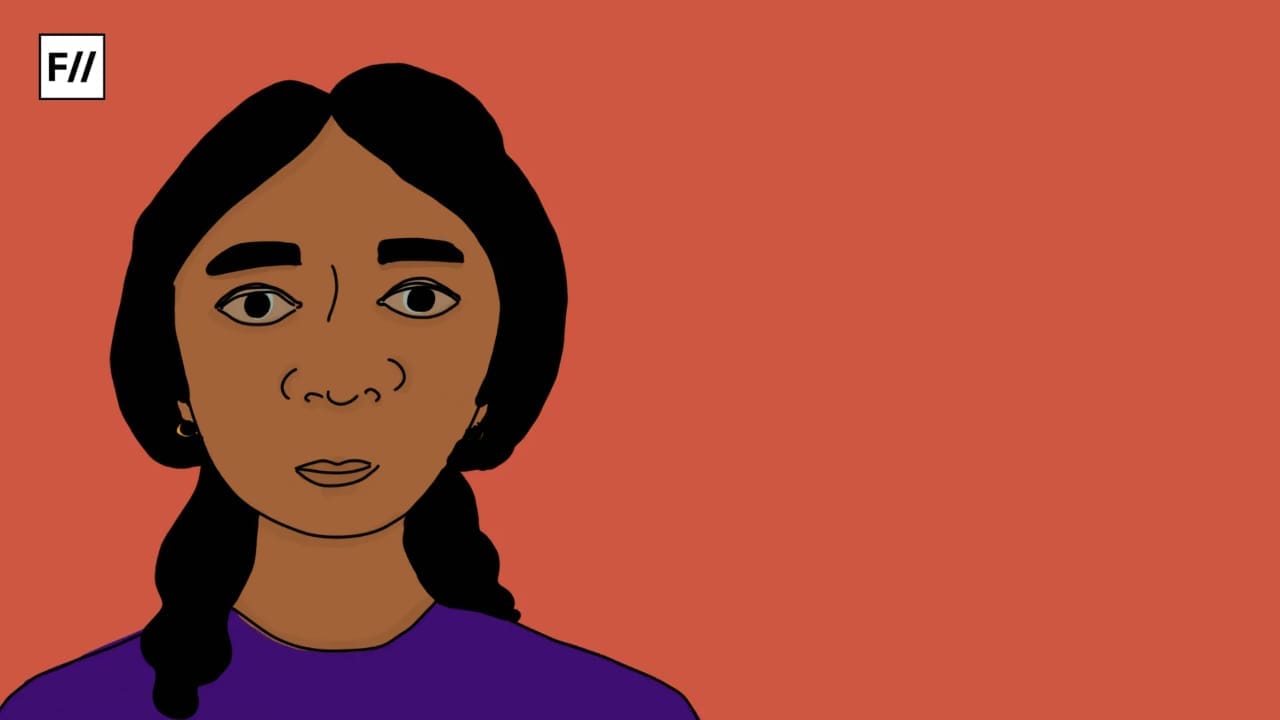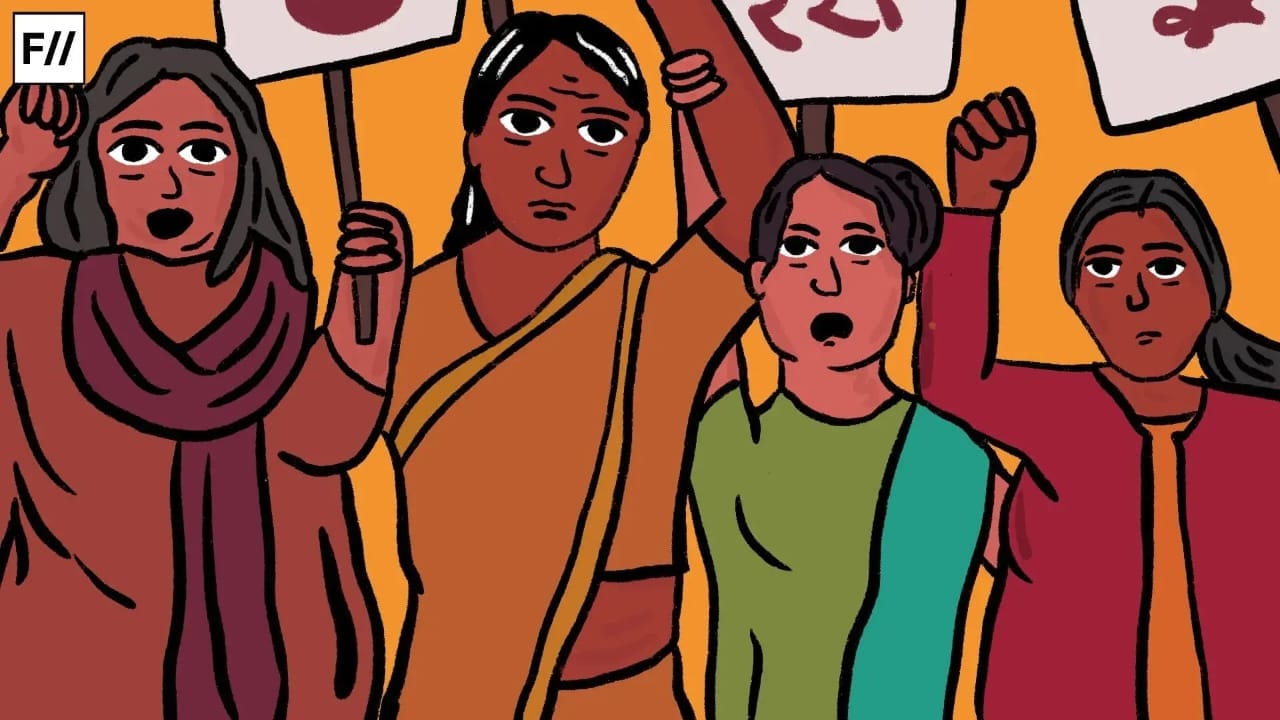Walking through the bustling and overcrowded Amira Kadal bridge in Srinagar city, we see hundreds of fisherwomen negotiating prices with buyers. Wearing traditional pherans (embroidered long robes) and traditional jewellery, they sit on the sidewalks of this famous bridge every day waiting for buyers. Through dust and clouds, rains and snow, curfews or shutdowns, they won’t be budged as they have mouths to feed back home.
Jaana Ded, one of the oldest fisherwomen says, ‘I have been sitting here for decades now, even when there is a firing or snow, I am here, what can I do?’
Jaana Ded is almost in her 80s, with a hookah by her side, she reminisces about the odds of this difficult job and how she has almost spent her entire life doing it.
Fisherwomen in Kashmiri are referred to as Gad Hanz (for the whole community irrespective of gender) or Gad Wajni as their profession is a manifestation of their caste and for centuries they have been limited to their caste-based profession.
Caste-based profession
Kashmiri society is a caste-based society, with clear hierarchies and discriminations perceptible in almost all of the social, and political institutions and sociocultural systems. However, these discriminations do not lead to segregating the community, barring people from religious sites, or preventing interdining among Kashmiri people. Nevertheless, marriages between two different castes which are considered to be ‘upper‘ and ‘lowered’ castes still seem a far-fetched concept for the society.
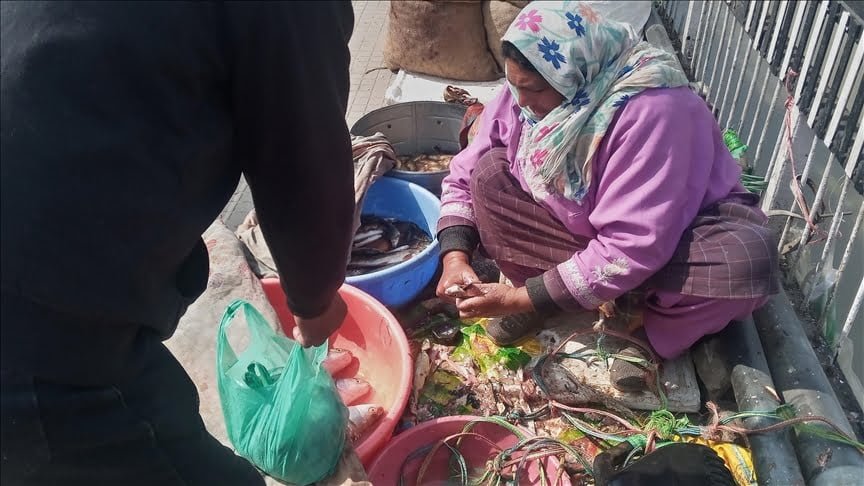
The fishing community or Gaz Hanz are one of the oldest communities in the valley and an early census of 1891 reported their numbers to be 33,870 as per Walter Lawrence’s book The Valley Of Kashmir. “As per the 2001 census of India, the Hanji population living in the lake and its periphery was about 135 thousand (which is currently estimated to be nearly 175 thousand and was only 70 thousand in 1980, showing a rapid increase in Hanji population). The sex ratio among Hanji was 919 males per thousand females and about 61 per cent of the population is in the productive age group of (15-59 years),” mentions the Demographic and Socio- Economic Profile of Hanjis of Dal Lake.
What is lacking in Walter Lawrence’s book and other research on the fishing community of Kashmir is that their caste is the basic explanation for their deprivation and limitations to upward social and economic mobility.
According to Walter Lawrence’s book The Valley Of Kashmir, the origins of this community or caste remain difficult to trace but their profession remains one of the oldest professions. It must be noted that this caste has subcastes and hierarchies within the caste system are upheld with utter rigour. According to Lawrence, the Gad Hanz are at the lowest of the caste system.
What is lacking in Walter Lawrence’s book and other research on the fishing community of Kashmir is that their caste is the basic explanation for their deprivation and limitations to upward social and economic mobility.
The discrimination based on caste against the fishing community, particularly the fisherwomen is quite evident through the interactions, perceptions and attitudes of the whole section of Kashmiri society. Even Walter Lawrence in his book, falls into the same trap of stereotyping and othering this community. He goes on to say that “the dunga and Gaz Hnaz are famous for their inventive powers and for their vocabulary of abuse.”
This perception of discrimination, stereotyping and othering of the community echoed through the opinions of fisherwomen also. They do not like their profession, sitting on the roads and haggling with people over prices. They find their jobs disrespectful. One of the fisherwomen Saima* mentioned ‘I wouldn’t do this job if I had a choice, I want a respectable job, there is no respect in sitting on the roads, other women scorn us and look at us with disrespect and contempt.’
Fisherwomen face various problems, from social and economic, to illiteracy, lack of sanitation, lack of proper housing, etc. With such disparities, fisherwomen wouldn’t be able to overcome their ‘inferior‘ position in Kashmiri society. Owing to these problems, mostly emanating because of their caste, and class, these women’s dreams of having respectable jobs remain unfulfilled.
In the research, Problems & prospects of Fisherwomen of Kashmir Valley, the authors mention, “Lack of any alternate employment also leads to many complications. They are forced to borrow money & it becomes difficult to pay back the money; the vicious circle of indebtedness continues. The fisherwomen also indicated low price for products and lack of assured markets as the main constraints. They sell their products to local households and in markets because of lack of a proper marketing channel.“
Conflict and its manifestations on fisherwomen
The decades-long conflict has taken its toll on everyone in the valley. And fisherwomen are no exception. They sit on the sidewalks, on the curbs on bridges, in the bustling markets and even travel to far-off villages to sell the fish. Their unique position in the market puts their safety and security at risk. Kashmir has always been rampant with curfews, cross-firings, encounters, shutdowns and hartals, and such uninhabitable conditions put fisherwomen’s lives in danger.
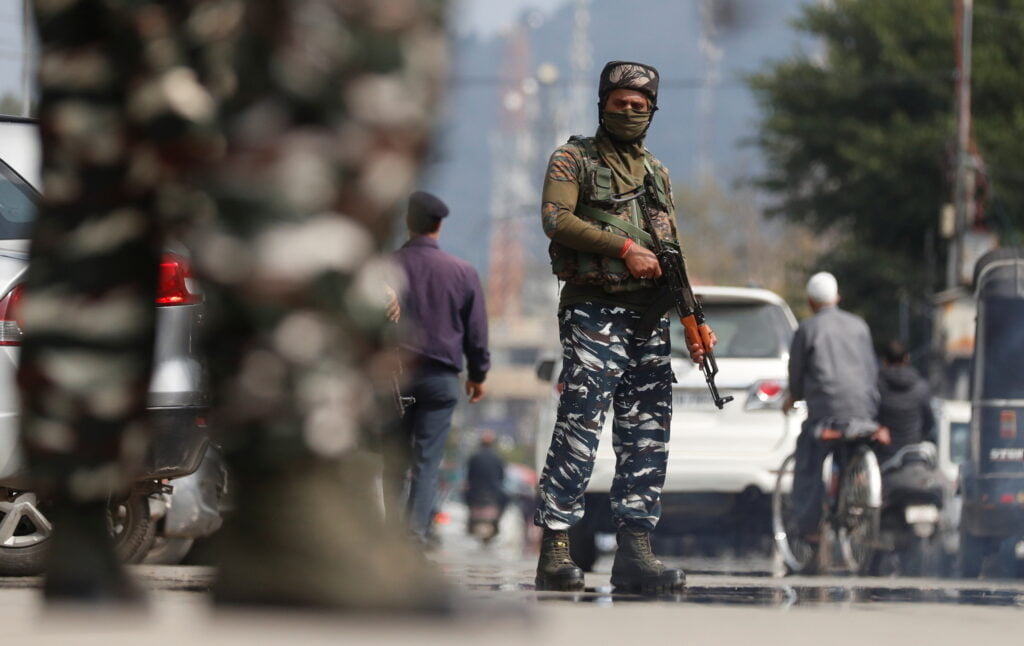
Despite the risks of sitting and selling their produce in treacherous situations, the fishing community has no other way to feed themselves and their families. Fishing is their sole source of income, and any disruption in their business can have severe consequences.
In a report by News Click, it is cited that after the abrogation of article 370 “Since August 5, the fish business has been reduced to Rs 4 lakh per day when it was worth between Rs 40 and Rs 50 lakh just prior to that. The market closed and only a few vendors have been allowed to operate by our association; that too, at a few places in Sopore town.”
Jaana Ded, mentions with tiredness in her eyes, that ‘I have been sitting here in the same spot for 80 years now, It is not a joke. Through firings and grenade blasts, I sit here 24×7. You can see there is army on all sides. Only god is here to save me.’
Men rule the roost
Shabeena remarks on how their lives are complicated. ‘This business depends on us, men are unable to do and carry it forward,’ she retorts in exhaustion. However, after some time, she begins to mention that the men sit idle during the day and catch fish during the night in the lakes and women sell those during the daytime in the markets, ‘we also help them to catch the fish many times,’ she remarks.
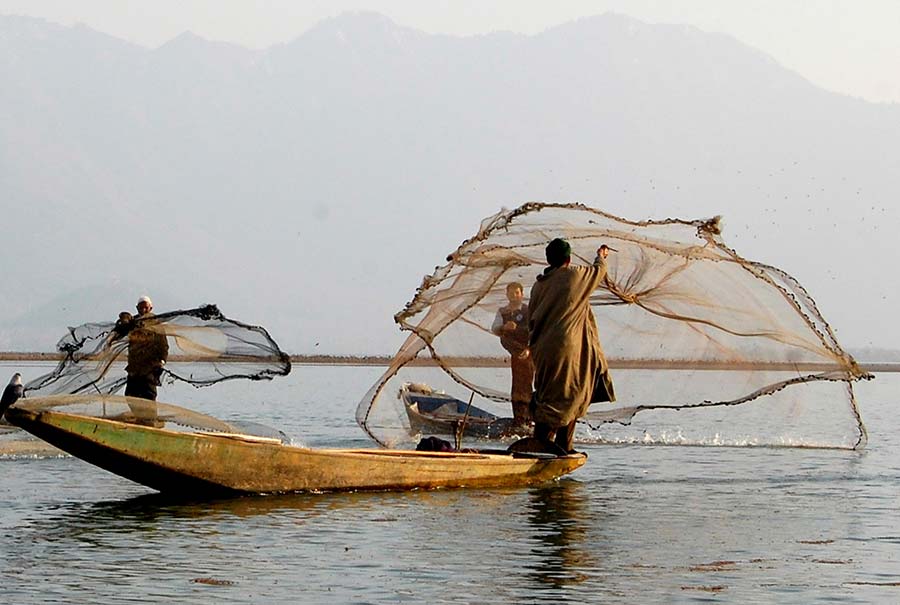
On the surface, one might start romanticising this brave-looking business model with fisherwomen sitting with their hookahs and speaking confidently, yet, that is not the case. These fisherwomen are as much the victims of patriarchy, gender norms and gender-based labour as every other woman. The men might allow them to sit and sell the fish on the streets but they are the ones making the decisions at the end of the day. These fisherwomen go home and either continue with household chores or their daughters or granddaughters carry the household duties.
One of the fisherwomen, Ashrafa* even retorted that ‘we would also like to be respected and would like our men to do the work,’ when asked if it is good to have choice and some autonomy.
In a study, it was reported, “Activities like cooking, childcare, children’s education, family health and sanitation are exclusively looked after by fisherwomen. Post-harvest fisheries activities, especially those involving preservation of products over several days (like fish drying, salting, smoking) are also done by many fisherwomen. They sell the dried/smoked fish in markets fetching them good rates. The direct involvement of women in fisheries sector is in activities viz. cleaning, fish trading, making value – added products, fish curing, etc. The indirect role women play are concerning decision making, financial management, family welfare.“
For fisherwomen, selling fish in the market, on roadsides, and going door to door is a ‘disrespectful‘ job, because the understanding is that men should be the bread earners. Although they do have some respect towards their profession as it feeds their bellies and lights their lamps, they would still like men to take up other jobs like government jobs and shun their age-old traditional profession.
Manifestations of patriarchy are observable in fisherwomen also. Their bold yet subservient position to their men even after taking up a difficult and risky profession, limiting themselves to the normative gender roles at home, their inability to own up to their role in their households and society, imbalanced power dynamics between men and women, are manifestations of deep-seated patriarchy.
However, caste also plays a negative role in their lives. In short, caste in relation to patriarchy, intertwined with the ongoing conflict, becomes decisive in determining the status and role of fisherwomen or Gad Wajni in Kashmiri society.
It is important to highlight that most of these fisherwomen would like ‘respectable‘ government jobs that pay well and are stable. One of the fisherwomen says she has made sure that her granddaughter studies (she is pursuing graduation) so that she gets a stable job.
The fisherwomen also registered their protest against the government for not doing anything for them. It is not a job that they would want to continue doing, it is something that has trickled down to them from generation to generation.
Shabeena mentions, ‘We are doomed, as there are hartals and curfews all the time, we have fish to sell. We are supposed to do this job no matter what. The government is not helping us at all. Funds never reach us.‘
*names have been changed to protect privacy
About the author(s)
Shahinda is a multimedia journalist with an experience of more than five years. She has an interest in covering politics, gender, conflict, and gender-based violence/crime. In addition, she has experience in reporting, photography and documentary filmmaking. She has done her Masters in Mass Communication from AJK MCRC Jamia Millia Islamia, New Delhi.



